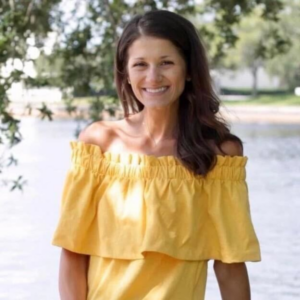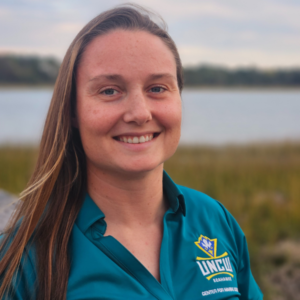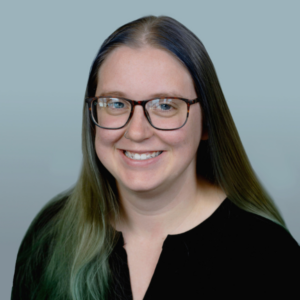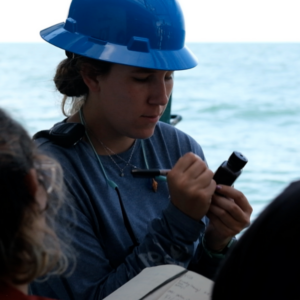In remembrance of Vembu Subramanian – our friend, colleague and the SECOORA Data Manager – we established an award for the next generation of ocean experts to meet others in their field and present their work at meetings or conferences. The Vembu Subramanian Ocean Scholars Award gives the opportunity for undergraduate students, graduate students, and early career professionals to seek funding to facilitate their participation in their conference of choice.
Our 2023 Winners are:
- Lydia Ruggles, University of South Florida
- Madison Lytle, University of North Carolina Wilmington
- Emma Graves, University of South Florida
- Samantha D’Angelo, University of South Florida
Read below to learn more about the winning students and their upcoming presentations!
Lydia Ruggles
Bacterial interactions with saxitoxin-producing Pyrodinium bahamense in Florida ecosystems: effects on growth, bloom formation, and toxin production
Pyrodinium bahamense adversely affects shellfish industries, economies, and public health. To date, the causes of bloom formation and toxin production are poorly understood. Through 3D fluorescent microscopy, DNA metabarcode analysis, and toxin assays on co-cultured samples, Lydia will assess the relationship between Pyrodinium and bacterial communities and the impact of micronutrients on bloom formation. Her research will determine if bacterially-produced micronutrients drive Pyrodinium blooms and toxin production.
“It is an honor to receive the Vembu Subramanian Ocean Scholars Award. This award has given me the opportunity to present my research on drivers of the Harmful Algal species, Pyrodinium bahamense, and learn from esteemed scientists at the Marine Microbes Gordon Research Conference.”
Lydia Ruggles, University of South Florida
Lydia will be presenting her research on Pyrodinium bahamenese at the Marine Micobes Gordon Research Conference (GRC) in Switzerland next June.
Madison Lytle
Effects of water clarity on seagrass, Halodule wrightii, persistence in North Carolina
Worldwide seagrass ecosystems are drastically being altered by climate change through rising water temperatures, shifting species distribution ranges, and human activities resulting in degraded water clarity. In North Carolina loss of temperate seagrass Zostera marina at the deep edge of the meadow has been documented since 2007. These losses are primarily attributed to increasing water temperatures and reductions in water clarity. Despite warming waters increasing the habitat suitability for the tropical seagrass Halodule wrightii, this species has not expanded to areas previously populated by Z. marina.
To determine if light is limiting to the expansion of H. wrightii at the meadow deep edge experimental shade plots (ambient light and 22% of surface light) were established along a water depth gradient (shallow 0.5m, deep 1.5 m). Preliminary results suggest that H. wrightii at deeper water depths were more stressed than shallower depths. Within the deep site there was no difference between treatments indicating that additional shading did not add any further stress to H. wrightii. This possibly indicates the lack of expansion of H. wrightii to the meadow deep edge is due to light limitation at current water clarity levels and that expansion may not occur unless light attenuation is reduced.
“Receiving the Vembu Subramanian Ocean Scholars Award will provide me with support to drive my research forward. By attending an international conference, I will receive valuable feedback on my research and build new collaborations within the global seagrass community. It is extremely motivating to have discussions with professionals in my field on the latest developments in coastal ocean science and management, knowing that we are all working towards the common goal of promoting healthy seagrasses habitats.”
Madison Lytle, University of North Carolina Wilmington
Madison will be presenting her research on Halodule wrightii at the World Seagrass Conference and International Seagrass Biology Workshop in Naples, Italy next June.
Emma Graves
Entrained Mississippi River Plume Shifts Phytoplankton Community Composition on the West Florida Shelf
The West Florida Shelf (WFS) is a unique coastal area that is generally oligotrophic with robust seasonal variation in circulation. Periodic interactions associated with the Loop Current, including intrusions of Mississippi River plume water, combined with local estuarine input and submarine groundwater discharge create an ideal ecosystem for supporting variable phytoplankton communities.
This study aimed to better characterize the phytoplankton community composition across the WFS using metabarcoding. In June 2022, seawater samples were collected from both the surface and chlorophyll maximum at 16 stations across the WFS, including samples collected from the Loop Current and an adjacent region of lower salinity water believed to be an entrained plume of Mississippi River influenced water. 18S metabarcoding was carried out on the filtered samples and matched to taxonomy to determine phytoplankton community composition at each station and then further analyzed across gradients of temperature, salinity, and nutrient and trace metal concentrations present at the stations. Distinct phytoplankton communities were observed in the entrained Mississippi River water surface plume indicating that the geochemical influence of the river on microbial populations can extend well into the WFS.
“I am so grateful to be selected for the Vembu Subramanian Ocean Scholars Award. Thank you to SECOORA for giving me the opportunity to present my research at the Ocean Sciences Meeting.”
Emma Graves, University of South Florida
Emma will be presenting her research on the phytoplankton community composition across the West Florida Shelf at the Ocean Science Meeting in New Orleans, Louisiana in February.
Samantha D’Angelo
USF-COMPS: A Higher Resolution Circulation Model and Real-Time Water Quality Observations for Tampa Bay
The mission of the Tampa Bay Observing Network (TBON) is twofold: to provide real-time water quality and meteorological data to stakeholders and to sustain these observations in order to generate long, continuous time series of water quality conditions within Tampa Bay, a large estuary with a delicate marine ecosystem. A key element of TBON is to provide relevant, high-accuracy data for monitoring water quality and for emergency management use in Tampa Bay. TBON will be used as an addition to the expansive water quality dataset present in Tampa Bay by providing a real-time aspect this watershed has never seen before. TBON is moving forward from transitional to more operational stages in terms of collecting circulation, meteorological, and water quality data.
“I am incredibly honored to be awarded the Vembu Subramanian Oceans Scholars Award. As an undergraduate, having the opportunity to present my research, A Real-Time Water Quality Observation Network for Tampa Bay, will allow me to expand my knowledge in this amazing scientific community. I am grateful to have received this award and to follow other great scientists in honoring Vembu.”
Samantha D’Angelo, University of South Florida
Samantha will be presenting on the TBON project at the Ocean Science Meeting in New Orleans, Louisiana in February.
Related news
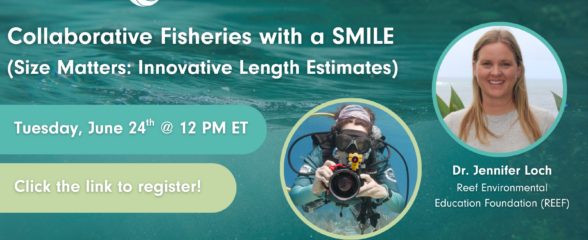
SECOORA Webinar: Collaborative Fisheries with a SMILE (Size Matters: Innovative Length Estimates)
On Tuesday, June 24th at 12 PM ET, Dr. Jennifer Loch from Reef Environmental Education Foundation (REEF) will discuss the SMILE (Size Matters: Innovative Length Estimates) project as part of SECOORA's Coastal Observing in Your Community Webinar Series.
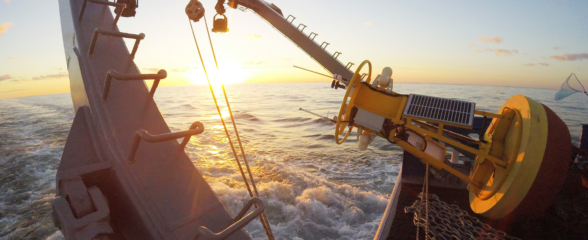
Funding Cuts to NOAA IOOS Will Hurt the Southeast
Proposed federal funding cuts would eliminate the IOOS Regional Observations budget for next year. Contrary to the budget Congress has already approved for this year, the Executive Branch wants these proposed cuts to go into effect in 2025.
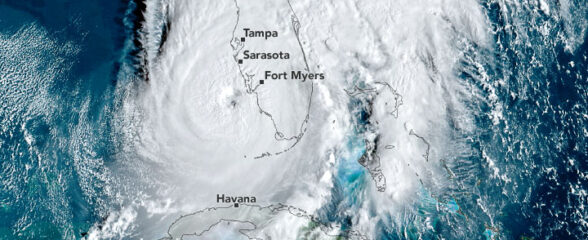
SECOORA Webinar on the Rapid Intensification of Hurricane Ian: Warm Subsurface Water on the Wide Continental Shelf
Join us Thursday, April 24th at 12 PM ET for the April installment of the SECOORA Coastal Observing in Your Community Webinar Series! This month, we will hear from Dr. Yonggang Liu from the University of South Florida. He will discuss his research on the rapid intensification of Hurricane Ian in relation to anomalously warm subsurface water on the wide...

